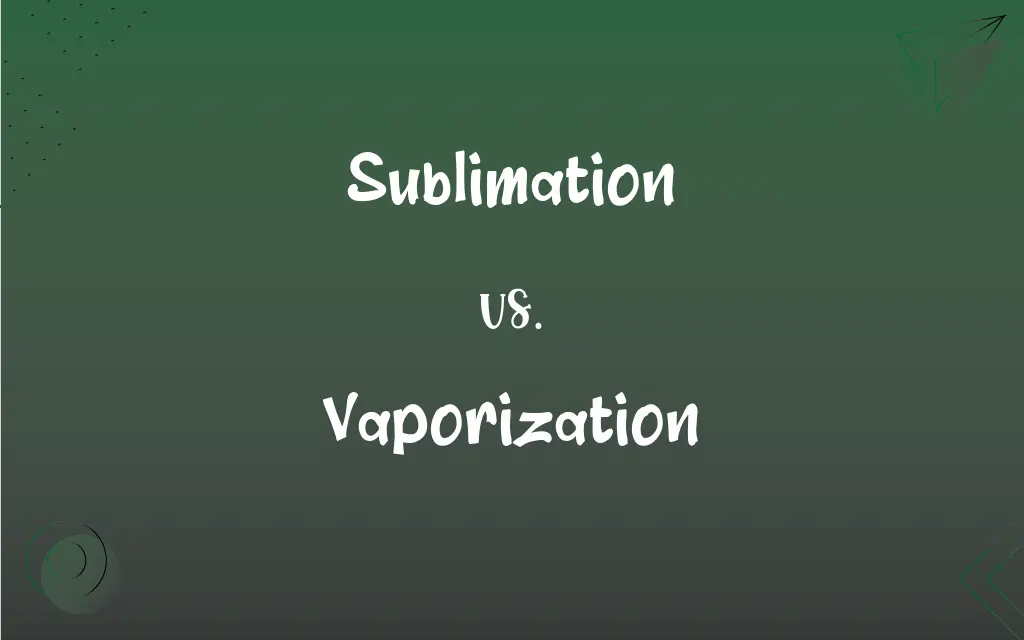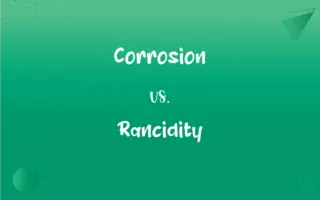Sublimation vs. Vaporization: What's the Difference?
Edited by Aimie Carlson || By Harlon Moss || Published on December 14, 2023
Sublimation is the transition of a substance directly from solid to gas, while vaporization is the change from liquid to gas.

Key Differences
Sublimation involves a substance changing from a solid directly to a gas, bypassing the liquid phase. Vaporization, on the other hand, is the process where a liquid turns into a gas, either through evaporation or boiling.
Sublimation occurs under specific conditions of temperature and pressure, often involving the absorption of energy. Vaporization requires energy to overcome the liquid's intermolecular forces, leading to its transformation into gas.
Examples of sublimation include dry ice turning into carbon dioxide gas. Vaporization is observed when water boils or evaporates.
Sublimation is utilized in freeze-drying and in certain printing technologies. Vaporization is a key process in distillation and in the natural water cycle.
Comparison Chart
Initial State
Solid
Liquid
ADVERTISEMENT
Final State
Gas
Gas
Intermediate Phase
No intermediate liquid phase
Goes through a liquid phase
Energy Requirement
Requires energy to change phases
Requires energy to overcome liquid’s intermolecular forces
Common Examples
Dry ice sublimating to CO2
Water boiling to steam
Sublimation and Vaporization Definitions
Sublimation
It involves skipping the liquid phase entirely.
In sublimation, iodine crystals directly become vapor without becoming liquid.
ADVERTISEMENT
Vaporization
Involves either evaporation or boiling.
Vaporization of water occurs faster when the pot is boiling.
Sublimation
Not all solids can sublimate.
Naphthalene balls used in wardrobes undergo sublimation over time.
Vaporization
A natural and essential part of the water cycle.
The vaporization of lake water contributes to cloud formation.
Sublimation
Occurs under certain pressure and temperature conditions.
Sublimation of snow and ice in the polar regions contributes to the water cycle.
Vaporization
Requires absorption of energy to occur.
Vaporization of alcohol in hand sanitizer occurs rapidly due to its low boiling point.
Sublimation
Sublimation is the process where a solid turns directly into a gas.
Dry ice undergoes sublimation at room temperature.
Vaporization
Vaporization is the change of a liquid to a gas.
When heated, water undergoes vaporization to become steam.
Sublimation
Employed in various technological applications.
Sublimation printing is used for creating high-quality designs on fabric.
Vaporization
Critical in the distillation process.
Vaporization is a key step in distilling spirits like whiskey.
Sublimation
To be transformed directly from the solid to the gaseous state or from the gaseous to the solid state without becoming a liquid.
Vaporization
To convert or be converted into vapor.
Sublimation
(Chemistry) To cause (a solid or gas) to sublimate.
Vaporization
A conversion of a solid or a liquid into a gas.
Sublimation
(Psychology) In psychoanalytic theory, to divert or modify (an instinctual impulse or drive) into an activity or interest of higher social value.
Vaporization
A destruction of something by turning it into vapor.
Sublimation
(Chemistry) A product of sublimation.
Vaporization
The act or process of vaporizing, or the state of being converted into vapor; the artificial formation of vapor; specifically, the conversion of water into steam, as in a steam boiler.
Sublimation
(chemistry) The transition of a substance from the solid phase directly to the vapor state such that it does not pass through the intermediate liquid phase.
Vaporization
Annihilation by vaporizing something
Sublimation
(psychology) The transformation of an impulse into something socially constructive.
Vaporization
The process of becoming a vapor
Sublimation
Elevation; exaltation; a making sublime.
Sublimation
The act or process of subliming, or the state or result of being sublimed.
Sublimation
The act of heightening or improving; exaltation; elevation; purification.
Sublimation
That which is sublimed; the product of a purifying process.
Religion is the perfection, refinement, and sublimation of morality.
Sublimation
(chemistry) a change directly from the solid to the gaseous state without becoming liquid
Sublimation
(psychology) modifying the natural expression of an impulse or instinct (especially a sexual one) to one that is socially acceptable
FAQs
Does vaporization always require heat?
Yes, heat is needed to provide energy for liquid molecules to become gas.
What is sublimation?
It's the direct transition of a solid to gas, bypassing the liquid phase.
What is vaporization?
It's the process of a liquid turning into gas, either through evaporation or boiling.
Can vaporization occur at room temperature?
Yes, through evaporation, like with water or alcohol.
Is sublimation a common natural process?
It's less common than vaporization and occurs under specific conditions.
What are examples of vaporization in daily life?
Boiling water, evaporating puddles, and drying clothes are common examples.
Is boiling water an example of vaporization?
Yes, boiling is a form of vaporization where liquid turns into gas.
Is sublimation reversible?
Yes, the reverse process is called deposition, where gas turns into solid.
What are industrial uses of vaporization?
Distillation, cooling systems, and power generation are some uses.
Can all solids sublimate?
No, only certain solids like dry ice can sublimate under specific conditions.
Is sublimation used in food processing?
Yes, particularly in freeze-drying to preserve food.
Is sublimation involved in inkjet printing?
Yes, some inkjet printers use sublimation for transferring images.
Can sublimation occur at any temperature?
No, it requires specific temperature and pressure conditions.
What is the difference in energy requirement for sublimation and vaporization?
Sublimation requires more energy as it involves breaking solid's stronger bonds.
Do both processes require energy?
Yes, both require energy, but sublimation typically needs more.
Are there any health risks with sublimation?
Depends on the substance; some, like naphthalene, can be harmful if inhaled.
Does vaporization affect humidity?
Yes, evaporating water contributes to atmospheric humidity.
Can vaporization occur under vacuum?
Yes, liquids can vaporize at lower temperatures under vacuum.
What role does vaporization play in the water cycle?
It's crucial for forming clouds and precipitation in the water cycle.
Does sublimation leave any residue?
No, it doesn't leave residue as the solid directly becomes gas.
About Author
Written by
Harlon MossHarlon is a seasoned quality moderator and accomplished content writer for Difference Wiki. An alumnus of the prestigious University of California, he earned his degree in Computer Science. Leveraging his academic background, Harlon brings a meticulous and informed perspective to his work, ensuring content accuracy and excellence.
Edited by
Aimie CarlsonAimie Carlson, holding a master's degree in English literature, is a fervent English language enthusiast. She lends her writing talents to Difference Wiki, a prominent website that specializes in comparisons, offering readers insightful analyses that both captivate and inform.






































































